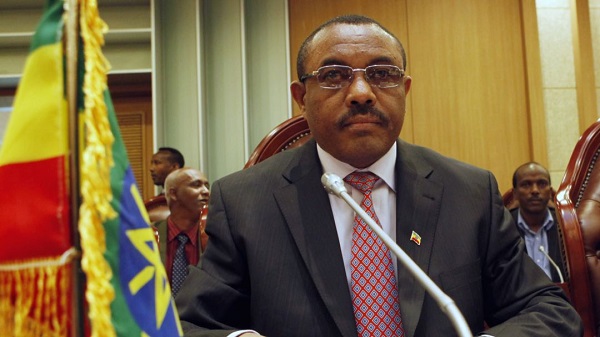
ADDIS ABABA (BBC News)–Ethiopian Prime Minister Hailemariam Desalegn has resigned unexpectedly, saying he hoped to end years of unrest and political upheaval.
In a televised address, he said his resignation was “vital in the bid to carry out reforms that would lead to sustainable peace and democracy”.
Mr Hailemariam, who has led the country since 2012, also stepped down as chairman of the ruling coalition.
Hundreds of people have died in three years of anti-government protests.
Demonstrations first spread across the country in 2015 amid calls for political and economic reform and an end to state corruption.
Most of the unrest has centered on Ethiopia’s two largest regions, Oromia and Amhara.
A 10-month national state of emergency that ended last year failed to stop the protests, as did the release of thousands of opposition supporters from jail last month..
“Unrest and a political crisis have led to the loss of lives and displacement of many,” Mr Hailemariam said.
“I see my resignation as vital in the bid to carry out reforms that would lead to sustainable peace and democracy.”
Leaders of the governing coalition – the Ethiopian People’s Revolutionary Democratic Front (EPRDF) – held an emergency meeting following the announcement, the Addis Standard website reported.
BBC Africa Correspondent Alastair Leithead says Ethiopia’s economic growth has been impressive but its steamroller approach to development has sparked years of regional, ethnic-based protest.
The old guard that runs Ethiopia is now afraid its federal, Soviet-style system could collapse, he adds, leaving two possible solutions – to crack down harder on dissent or to try political reform.
Mr Hailemariam said he will stay on as a caretaker prime minister until parliament and the EPRDF accept his resignation and choose a replacement.
Hailemariam Desalegn has resigned. But why?
Analysis by Kalkidan Yibeltal, BBC Amharic Service, Addis Ababa
Since coming to power, Mr Hailemariam has been seen by the political elite as weak and lacking in leadership.
His resignation could be a move by the coalition to find a stronger leader, or it could signal divisions among the constituent parties along ethnic lines.
Read the complete story at BBC Africa
